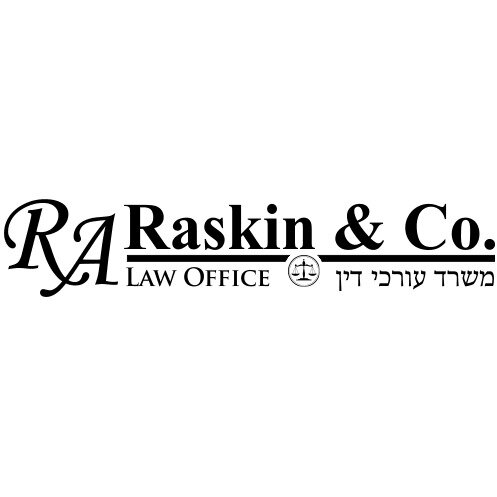Best Citizenship Lawyers in Haifa
Share your needs with us, get contacted by law firms.
Free. Takes 2 min.
List of the best lawyers in Haifa, Israel
About Citizenship Law in Haifa, Israel
In Israel, citizenship laws are predominantly governed by the Law of Return, the Citizenship Law of 1952, and related statutes. These laws offer a pathway to citizenship for Jews, their descendants, and spouses. Additionally, Israeli citizenship can also be acquired by birth, descent, residence, or naturalization, subject to specific conditions. Haifa, being one of the major cities in Israel, adheres to these national citizenship laws without particular local variances. Whether looking to immigrate, settle, or claim citizenship, understanding the framework of these laws is crucial.
Why You May Need a Lawyer
Navigating citizenship laws can be complex. Here are common situations where legal assistance may be required:
- Applying for citizenship through the Law of Return or naturalization.
- Addressing challenges related to dual citizenship or renunciation.
- Handling citizenship status for children born in or out of Israel.
- Dealing with residency issues that affect citizenship status.
- Assisting individuals without legal status in Israel who seek citizenship.
- Appealing decisions made by the Ministry of Interior regarding citizenship.
- Clarifying rights and obligations that come with Israeli citizenship.
Local Laws Overview
Haifa, like the rest of Israel, follows national citizenship regulations under several laws:
- Law of Return: Grants every Jew the right to immigrate to Israel and gain citizenship.
- Citizenship Law of 1952: Outlines the conditions for citizenship by birth, descent, residence, and naturalization.
- Entry into Israel Law of 1952: Regulates the entry and stay of non-citizens in Israel.
- Nationality Law: Covers eligibility criteria, including requirements for residency and renunciation of previous citizenships.
- Adoption Law: Provides citizenship pathways for individuals adopted by Israeli citizens.
Frequently Asked Questions
How do I apply for Israeli citizenship under the Law of Return?
Applications can be submitted at an Aliyah (immigration) center. You will need to provide proof of Jewish heritage, such as documents or rabbinical letters.
Can someone born in Haifa automatically gain Israeli citizenship?
A person born in Haifa to an Israeli citizen parent automatically acquires Israeli citizenship. However, specific rules apply if the parents are non-citizens.
What is the process for an adopted child to gain Israeli citizenship?
An adopted child can gain Israeli citizenship if adopted by Israeli citizens. Legal procedures, including court approvals, will be necessary.
Can I hold dual citizenship with Israel?
Yes, Israel allows dual citizenship. Understanding the implications on taxation and military service obligations is advisable.
Is it possible to lose Israeli citizenship?
Citizenship can be revoked in cases of fraudulent acquisition or voluntary renunciation. The Ministry of Interior oversees such decisions.
How does marriage affect my spouse's eligibility for Israeli citizenship?
A spouse of an Israeli citizen can apply for citizenship, typically requiring a gradual process involving temporary residency before gaining full citizenship.
What are the residency requirements for naturalization?
Applicants need to reside in Israel for three out of the five years preceding the application and demonstrate some knowledge of Hebrew.
How can I appeal a denial of my citizenship application?
Appeals can be made through the Ministry of Interior or, if necessary, the administrative courts. Legal advice can be highly beneficial in these cases.
Does serving in the IDF automatically grant me citizenship?
Volunteers in the IDF (Israel Defense Forces) who are not citizens may apply for a fast-tracked citizenship process.
What documents are required for a citizenship application?
Common documents include a valid passport, proof of residency, birth certificate, and any supporting documents proving eligibility, such as a marriage certificate or proof of Jewish heritage.
Additional Resources
For further assistance, consider reaching out to the following:
- Ministry of Interior: The main governmental body handling citizenship applications.
- The Jewish Agency for Israel: Provides support for Aliyah and settlement in Israel.
- Haifa Legal Aid Bureau: Offers legal assistance and advice for residents of Haifa.
- NGOs and Community Organizations: Various organizations assist immigrants and those seeking citizenship, such as Nefesh B'Nefesh and HIAS Israel.
Next Steps
If you need legal assistance with Israeli citizenship in Haifa, start by gathering all pertinent documents. Seek advice from a qualified immigration or citizenship lawyer familiar with local statutes. You can contact local law offices or use services offered by legal aid organizations for preliminary consultations. Ensuring that you meet all eligibility criteria and submitting detailed, correctly filled-out applications can significantly accelerate the process.
Lawzana helps you find the best lawyers and law firms in Haifa through a curated and pre-screened list of qualified legal professionals. Our platform offers rankings and detailed profiles of attorneys and law firms, allowing you to compare based on practice areas, including Citizenship, experience, and client feedback.
Each profile includes a description of the firm's areas of practice, client reviews, team members and partners, year of establishment, spoken languages, office locations, contact information, social media presence, and any published articles or resources. Most firms on our platform speak English and are experienced in both local and international legal matters.
Get a quote from top-rated law firms in Haifa, Israel — quickly, securely, and without unnecessary hassle.
Disclaimer:
The information provided on this page is for general informational purposes only and does not constitute legal advice. While we strive to ensure the accuracy and relevance of the content, legal information may change over time, and interpretations of the law can vary. You should always consult with a qualified legal professional for advice specific to your situation.
We disclaim all liability for actions taken or not taken based on the content of this page. If you believe any information is incorrect or outdated, please contact us, and we will review and update it where appropriate.











